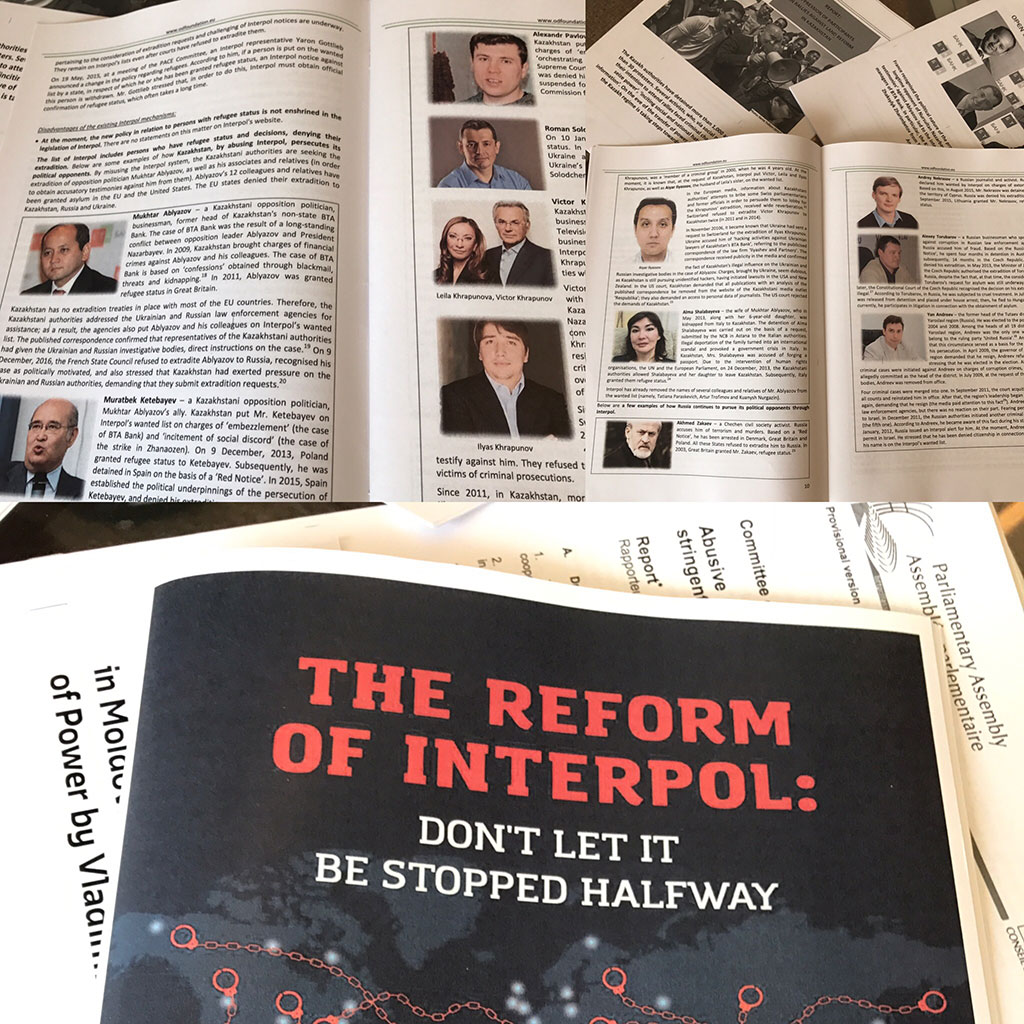Legal situation of political dissidents from Kazakhstan, whom European countries refused to extradite at Kazakhstan’s request
On 7 July 2011, Mukhtar Ablyazov was granted political asylum in the UK.
Switzerland twice, in 2011 and 2014, declined Kazakhstan’s request to extradite Victor Khrapunov. The members of the Khrapunov’s family hold a residence permit in Switzerland.
In 2001, Kazakhstan authorities lodged a mutual assistance request with Switzerland in a criminal investigation initiated in Kazakhstan.
As part of cooperation with Kazakhstan, Ukraine lodged with Switzerland a request for Iliyas Khrapunov to be extradited.
Kazakhstan also brought civil legal actions against Iyas Khrapunov in the UK.
On 9 December 2012, Muratbek Ketebayev, a close associate of Mukhtar Ablyazov was granted refugee status in Poland. Request that Ketebayev be extradited from Poland to Kazakhstan was rejected.
On 31 may 2013, Mukhtar Ablyazov’s wife, Alma Salabayeva, with her daughter Alua were unlawfully, without documents, smuggled out of Italy to Kazakhstan by a private plane chartered by the Kazakhstan government. This was engineered by the Kazakhstan Foreign Affairs Ministry with the help of Kazakhstan’s special services.
On 18 July 2013, Italian political forces had the UN High Commissioner on Human Rights adopt a resolution on Alma Shabalayeva’s rights infringement.
On 31 July 2013, in France, not far from the city of Cannes, a French special forces detachment detained the ex-owner of Bank Turan Alem (BTA), Mukhtar Ablyazov, the chief political opponent of Kazahstan’s president Nursultan Nazarbayev.
On 11 September 2013, Belgian authorities recognized the political refugee status of Botagoz Zhardemali, a colleague of the ex-banker, opposition politician Mukhtar Ablyazov’s.
On 27 December 2013, thanks to active legal help secured by Iliyas Khrapunov, the wife of President Nazarbayev’s political opponent, Alma Shalabayeva, kidnapped by Kazakhstan’s special services from Italy, returned to Italy with her daughter.
In May 2014, the city of Almaty initiated the first legal proceedings in the US, in the federal court of Los Angeles, California, against Victor and Leila Khrapunov, their son Iliyas Khrapunov and his wife Madina Ablyazova, the Khrapunovs’ daughter Elvira and her husband.
The second legal proceedings were initiated by the Republic of Kazakhstan against Iliyas Khrapunov and opposition politician Muratbek Ketebayev.
The third legal proceedings were initiated in the city of New York by BTA Bank of the Republic of Kazakhstan and the city of Almaty against Ablyazov and Khrapunov’s organized criminal groups.
On 19 June 2014, Switzerland once more declined Kazakhstan’s request to extradite Victor and Leila Khrapunov.
On 30 July 2014, the Italian Supreme Cassation Court declared illegal the expulsion to Kazakhstan of Alma Shalabayeva, the wife of Kazakhstan opposition politician, ex-president of Kazakhstan’s BTA Bank, Mukhtar Ablyazov.
On 18 April, Italy granted refugee status to Alma Shalabayeva, the wife of BTA Bank ex-president Mukhtar Ablyazov.
On 18 December 2014, The Czech Republic Ministry of the Interior adopted a decision to provide international protection to Tatyana Paraskevich.
In 2014, Zhaksylyk Zharimbetov and Roman Solodchenko, colleagues of the banker and opposition politician Mukhtar Ablyazov’s, were granted refugee status in London.
On 25 February 2015, the Supreme Court of Spain, made a ruling that political asylum be granted to Kazakhstan national Alexander Pavlov, ex-chief of security service for the political emigre and former president of BTA Bank Mukhtar Ablyazov. The Spanish court also revoked a ruling that Pavlov should be extradited to Kazakhstan.
In December 2015, the city of Almaty mayor’s office and their attorney, Mе Christophe Emonet, brought unsubstantiated lawsuits against 11 members of the Khrapunov family resident in Switzerland. Financial claims were made on each individual member of the family, including Leila Khrapunova’s 87- and 77-year old parents.
On 9 December 2016, after remaining in custody for over three years in France, Kazakhstani opposition politician and businessman Mukhtar Ablyazov was set free.
On 9 December 2016, France’s Council of State rejected a request for Mukhtar Ablyazov’s extradition, acknowledging its political nature, Ablyazov’s political asylum in the UK, and facts of pressure by Kazakhstan authorities. The French Council of State noted that criminal prosecution against Ablyazov, enjoying political refugee status, had arisen from his opposition stance. The Council of State emphasized that Kazakhstan had put pressure for Ukrainian and Russian authorities to lodge extradition requests. It was also noted that Russia and Kazakhstan were coordinating their operations as part of the Russian extradition request procedures.
Currently, one principal legal action and several consequential hearings are taking place in London.
In Ukraine, the Kazakhstan-initiated criminal case of hacking is being heard.
No official information on charges is available for Russia.
It is important to note that all the court proceedings in the USA and London have up to now addressed only one issue, that of the right jurisdiction for the Khrapunovs. In other words, these countries’ courts have only been considering the issue of whether the lawsuits by the city of Almaty and the Republic of Kazakhstan should be accepted for hearing.
Kazakhstan authorities’ strategy of persecuting the political opponents of the self-perpetuating president Nazarbayev’s autocracy, where the extradition of opposition members was declined, aims to torment the persecution target with civil legal actions and criminal prosecution in various countries and jurisdictions. Their goal is to preclude final decisions regarding their charges so as to avoid high-profile court trials on Europe which could shed light on corruption crimes of Nursultan Nazarbayev himself and his family members. This brings to mind the circumstances of the strange death in an Austrian prison of Rakhat Aliyev just before the day of the court hearings.

